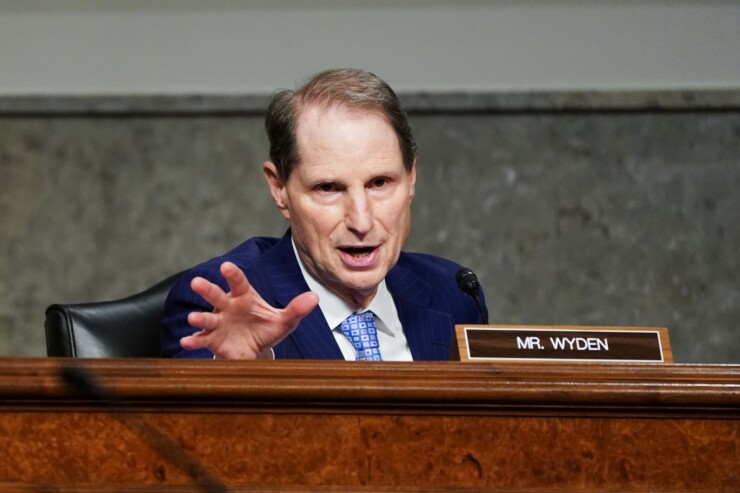
The chances for the public finance sector benefiting from significant advances in federal tax policy in 2021 are increasing as Democrats appear to have an even chance of gaining majority control of the Senate in the November election.
Advance refunding, direct-pay bonds and increased limits on bank-qualified bonds would be among the muni-friendly tax provisions that have a good chance of becoming law if Democrats control both chambers of Congress.
Additional direct federal aid to state and local governments also would no longer be blocked by the Senate.
The Bond Dealers of America released an election analysis Thursday saying it “strongly believes that individual municipal bond provisions have a greater than even chance of passage in the 117th Congress.”
“The BDA strongly believes that the municipal bonds are in a strong position in 2021, regardless [of] the outcomes,” the analysis said.
But Senate Democrats have “a greater understanding and recognition that state and local government has really been hammered by the coronavirus because they have to balance their budgets,” said Frank Shafroth, director of the center for state and local leadership at George Mason University.
Shafroth, a former director of federal relations for the National League of Cities and later for the National Governors Association, said municipal finance is important to Americans’ everyday life and has not traditionally been a partisan issue.
“When you think of the pandemic, the first phone number Americans dial is 911 and the federal government doesn’t answer that call,” Shafroth said. “When the Pentagon and the World Trade towers were hit on 9/11, the number that people dialed that day was 911. It was the deputy commander of Arlington County who commanded all federal, state and local responders putting out the fire at the Pentagon. The Pentagon didn’t even have a fire truck.”
Shafroth predicted a Democratic House and Senate would act on an economic stimulus early in 2021 as they did when President Obama took office in 2009.
The first wave of legislation could come as early as February, as it did in the second month of the Obama administration when the new president signed into law the $831 billion American Recovery and Reinvestment Act.
Republicans currently hold a 53-47 edge in the upper chamber that has served as an insurmountable barrier for consideration of the muni-friendly provisions in the House-passed Moving America Forward Act.
Senate Majority Leader Mitch McConnell, R-Ky., also has told President Trump the majority of his caucus doesn’t support generous aid to state and local governments.
“We are seeing a lot of fatigue on the Republican side, on spending more money,” said Sarah Bianchi, senior managing director and head of U.S. public policy and political strategy research at Evercore ISI.
Bianchi, who served as director of economic and domestic policy for Vice President Joe Biden and deputy assistant to President Obama, spoke Monday to the National Association of Business Economists.
If Democrats do gain a Senate majority, Bianchi predicted the party’s agenda will be limited by its more conservative members.
“The Democratic senators that you're bringing into the mix, in such a scenario, are from conservative parts of this country -- Arizona, North Carolina -- these are not kind of Medicare-for-all liberals, if you will,” she said. “They are conservatives, and they are not going to vote for a lot of this stuff. And keep in mind that Democrats already have a couple of more conservative senators on their bench right now with Jon Tester [of Montana] and Joe Manchin [of West Virginia].”
Non-partisan election analyst Charlie Cook most recently predicted a “photo finish.”
“The reality is that the Senate is going to be a close call, compounded by the fact that there will be at least one, if not two, Jan. 5 runoff elections for the seats in Georgia,” Cook wrote in National Journal. “The difference between the GOP losing just one or two seats and losing five or six may not be much.”
Democrats have only two vulnerable Senate seats in the Nov. 3 election compared to 10 on the Republican side, according to the Cook Political Report.
Democratic Sen. Doug Jones of Alabama is an underdog in his race while Sen. Gary Peters of Michigan is in a race that’s rated as lean Democrat. Polls over the last month have found Peters with a composite average lead of 4.4 percentage points over his Republican challenger John James.
Meanwhile, two Republicans incumbents -- Sens. Martha McSally in Arizona and Cory Gardner of Colorado -- are in races rated by the nonpartisan Cook Political Report as “lean Democrat.”
Six other Republicans are in races that Cook rates as tossups: Sens David Perdue in Georgia, Joni Ernst in Iowa, Susan Collins in Maine, Steve Daines in Montana, Thom Tillis in North Carolina, and Lindsey Graham in South Carolina.
Democrats are heavily favored to retain their majority in the House and could reintroduce the Moving Forward Act in 2021 as their off-the-shelf prescription for kickstarting the economy with infrastructure spending.
Under a Democratic Senate, the chairmanship of the critical Finance Committee would switch from Republican Sen. Charles Grassley of Iowa to Democratic Sen. Ron Wyden of Oregon.
Wyden, who prefers to push legislation that has bipartisan consensus, might make changes to the House bill to gain at least some Republican votes.
The BDA election analysis described Wyden as an advocate of “principled bipartisanship” who works to find solutions that allow all parties to stay true to their respective principles while taking the best ideas from all sides.
Wyden has a record of supporting the creation of direct-pay bonds before Build America Bonds became law in the 2009 American Recovery and Reinvestment Act. He’s also been a supporter of tax credit bonds.





